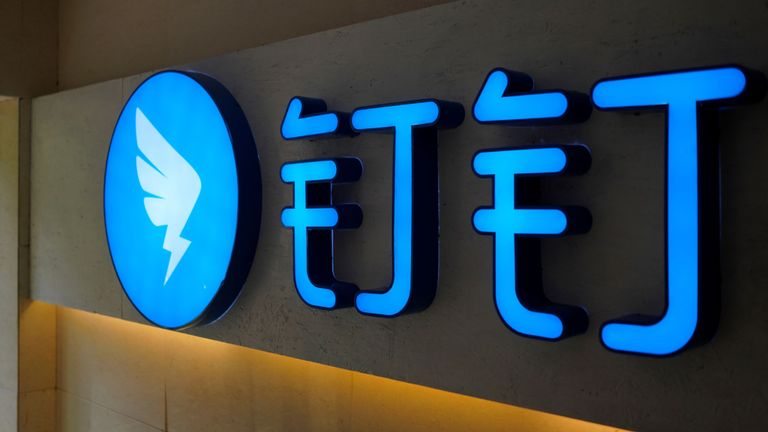The rapid rise in cases of COVID-19 has met with fear, uncertainty and panic in countries across the world - with one exception: certain corners of the tech sector.
There, the threat of pandemic has prompted a thrill of entrepreneurial enthusiasm.
"While we hate the reason for it, we're excited," Michael Helmbrecht, chief operating officer at video conferencing company Lifesize, told Sky News.
With non-essential travel banned and office staff encouraged to work from home, Lifesize has seen a surge of interest in its free and paid-for products, which offer high-resolution "video solutions" for remote meetings.

Coronavirus: The infection numbers in real time
"We've seen an explosion of interest and usage of our service since the middle of January," [when COVID-19 cases first emerged] said Mr Helmbrecht.
"In Asia alone, minutes of usage on our service are up 100% in that time. They're up a third just in the last week as it continues to grow.
"We're also seeing similar, but not quite as high growth, in Europe and North America. Those are also setting records in terms of growth rates."

How does COVID-19 attack the human body?
Lifesize is not the only video conference company benefiting from the epidemic. US firm Bluejeans claims to have seen "increases in video conferencing traffic on our network from January to February of 4x in China and 3x across Asia Pacific".
As the market plunged in February, shares in online meeting company Zoom shot up 50%.
Big tech firms have been quick to scent an opportunity. Google announced on Tuesday that it would be giving away free access to its advanced video-conferencing capabilities until 1 July 2020 - a move quickly followed by Microsoft.

Coronavius: Got a question? Ask Sky News
Could this be the start of a shift towards remote working?
"When there was a Tube strike a few months back a lot of people took different routes, but when the strike was over they stuck with those routes," says Sam Dumitriu, research director for The Entrepreneurs Network.
"It's a test case for a lot of people: can you make remote working work in your office? Because this is something that's been promised for a long time but has never quite materialised."

Coronavirus test kits delivered to cruise ship
Not everyone is a fan.
"In our opinion it isn't as good as face-to-face long-term," said Chris Lee, chief financial officer at global marketing company Jellyfish, which has had to close its Hong Kong, Italy and Singapore offices in response to the coronavirus outbreak.
"It's great as an interim, it really helps give people flexibility. But long-term we're a huge believer in collaboration and people collaborate best face-to-face."
If the virus spreads, it's not just video conferencing that may benefit. Data gathered for Sky News by mobile analyst Sensor Tower has assessed consumer behaviour by tracking app installs on China's App Store.
It found downloads of business, productivity and education apps surging as workers and students worked from home.

Image:DingTalk has been downloaded more than 17 million times in China since COVID-19 struck
Between 1 January and 18 January 2020, for instance, Alibaba's remote work app, DingTalk, was downloaded 670,000 times; then COVID-19 struck. Since then, the app has been downloaded more than 17 million times in China.
Chinese tech giant Tencent's meeting app went from 250,000 all-time downloads at the end of January to more than 9 million by the end of February.
Overall, downloads on the Chinese App Store for all apps increased by approximately 48% in February 2020 year-over-year from February 2019.
Other apps that performed well in China included grocery delivery apps and gaming apps, which gained users as people spent more time indoors.
Listen to "How will health services cope with COVID-19? | 4 March 2020" on Spreaker.
**:: Listen to the Daily podcast on **
Apple Podcasts
**, Google Podcasts
, Spotify
, Spreaker
**
But the data from China shows that not all tech companies stand to benefit. Rideshare apps - the Chinese equivalents of Uber, Gett and Bolt - experienced what Sensor Tower called "a meaningful decline", dropping 75% in installs between the weeks beginning 13 January and 10 February.
"As people start returning to their places of work, you can expect behaviour to start returning to normal. However, as our data estimates show, such as those for ridesharing, for example, a return to normality looks to be slow," says Sensor Tower co-founder Oliver Yeh.
Add those tech companies to the ones with supply chains in China and it's clear that not every firm is looking at the situation with optimism. But overall, COVID-19 looks likely to increase our reliance on digital technology - much like everything else.
 简体中文
简体中文

